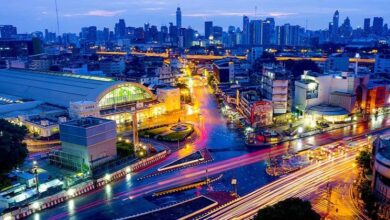In the ever-evolving world of technology, one industry is beginning to experience a major transformation—the agriculture sector. The intersection of technology and farming is no longer just a concept but a thriving reality, and at the forefront of this shift is d.farm, a game-changing platform that is redefining the future of agriculture. As our world faces the dual challenges of growing populations and climate change, d.Farm is leveraging digital innovation to provide sustainable, efficient, and forward-thinking solutions for farmers everywhere.
What is d.farm?
At its core, d.farm is a digital agricultural platform designed to enhance farming through data and technology. Built with the idea that farming can be more productive, more sustainable, and more environmentally friendly through the integration of digital tools, d.farm offers a variety of services for modern farmers. From crop management to precision farming, d.farm simplifies the complexities of farm management by using big data, machine learning, and real-time analytics.
d.farm helps farmers gather, process, and analyze vast amounts of data from sensors, drones, satellites, and other sources to make data-driven decisions. By providing critical insights in real-time, farmers can optimize operations, reduce costs, and ultimately improve their crop yields.
The Role of Technology in Modern Agriculture
For years, agriculture has operated on methods that rely heavily on tradition, with techniques passed down over generations. While these methods have served farmers well, they are no longer enough to meet the increasing demands of a global population and the strain placed on natural resources. It’s here where d.farm comes in—an innovative system that fuses agricultural knowledge with cutting-edge technology.
Through precision farming tools, such as sensors that monitor soil health, drones that provide aerial surveillance of crops, and automated machinery for planting and harvesting, d.farm helps farmers make smart decisions. These tools offer vital information on everything from moisture levels in the soil to pest activity, allowing farmers to act with precision rather than relying on broad, blanket approaches.
One of the main benefits of digital agriculture, as exemplified by d.farm, is its ability to reduce waste and improve resource management. Traditional farming methods often lead to overuse of water, fertilizers, and pesticides, causing both financial loss and harm to the environment. By using sensors and data analytics, d.farm helps farmers reduce waste and boost sustainability by applying resources in exactly the right amounts, at the right times.
Data-Driven Farming for Better Decisions
Gone are the days of making agricultural decisions based solely on gut feeling or out-of-date techniques. With the rise of platforms like d.farm, data has become a vital component of modern farming. One of the key features of d.farm is its ability to analyze massive amounts of data from multiple sources and transform it into actionable insights.
For example, satellite imagery and drone surveillance offer real-time visuals that show the health of crops over vast areas of farmland. This allows farmers to detect areas that are suffering from disease, pests, or nutrient deficiencies before they become widespread problems. This level of visibility was once unattainable, but now, with d.farm, problems can be identified, and solutions can be implemented rapidly.
Moreover, the data processed by d.farm helps predict weather patterns, estimate crop yields, and even forecast the best times to plant or harvest. This predictive capability not only saves time but also maximizes efficiency, leading to higher productivity.
Enhancing Sustainability with d.farm
Sustainability is one of the driving forces behind the development of d.farm. With global climate challenges such as droughts, soil degradation, and unpredictable weather, sustainable agriculture practices are no longer a luxury but a necessity. Traditional farming, while effective for centuries, is proving inadequate in the face of these modern challenges.
d.farm embraces a sustainable approach by helping farmers minimize their environmental impact. Through the platform, farmers gain insights into more efficient land use, water conservation techniques, and optimized crop rotation practices. The emphasis is on long-term soil health and resource preservation, ensuring that today’s agricultural practices don’t harm the resources needed by future generations.
For instance, by optimizing irrigation systems using real-time weather data, d.farm helps conserve water—an essential resource increasingly strained around the globe. In regions suffering from droughts or erratic rainfall, precise water management has a transformative impact, both economically and environmentally.
Empowering Farmers through Education and Collaboration
While technology plays a pivotal role in d.farm’s operations, the platform also focuses heavily on supporting farmers in navigating the new digital landscape. Through user-friendly tools, in-app resources, and dedicated customer support, d.farm empowers farmers of all technological skill levels to succeed. The platform’s design is focused on providing intuitive interfaces and educational resources, ensuring that no farmer feels left behind in the digital revolution.
Additionally, d.farm fosters collaboration among farmers. Through shared knowledge, digital networking, and data-sharing capabilities, farmers can learn from each other, exchange best practices, and tackle challenges collaboratively. The communal aspect of d.farm’s ecosystem ensures that farming doesn’t feel like a solitary endeavor but rather a network of growers working toward shared goals.
The Future of d.farm: A New Horizon for Farming
As the agriculture industry continues to adopt technology, the potential for d.farm to transform the sector is boundless. With growing interest in food security, climate adaptation, and sustainable farming practices, d.farm is positioned to be a catalyst for lasting change.
In the coming years, d.farm is likely to expand further, integrating even more advanced technologies like artificial intelligence, blockchain for supply chain transparency, and genomics for crop research. Through continued innovation, d.farm will remain at the forefront of a farming revolution—one that marries the wisdom of generations past with the potential of technology to ensure a prosperous and sustainable future.
Conclusion
d.Farm represents the convergence of agriculture and technology, marking a new era in farming. By providing farmers with essential tools and insights, d.farm empowers them to make better decisions, increase productivity, and minimize their environmental impact. As we move further into the future, the marriage of data and agriculture will play an increasingly pivotal role in ensuring the health and sustainability of our planet—one farm at a time.





